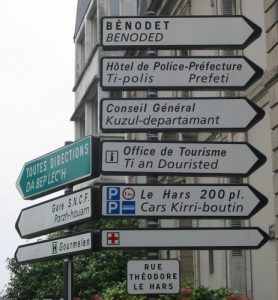By Sarah-Claire Jordan
 Of all the languages spoken in France, Breton may be one of the most fascinating. Breton is a regional language spoken in the Brittany region of France. It doesn’t share very much with Romance languages, much less French, as it is actually an Insular Celtic language, meaning it originated in the British Isles. It was brought over to what is now France by Britons who migrated to the area in the Middle Ages.
Of all the languages spoken in France, Breton may be one of the most fascinating. Breton is a regional language spoken in the Brittany region of France. It doesn’t share very much with Romance languages, much less French, as it is actually an Insular Celtic language, meaning it originated in the British Isles. It was brought over to what is now France by Britons who migrated to the area in the Middle Ages.
Besides being the only Celtic language of France, there are a lot of interesting bits of information about Breton. Here are four things in particular that make it stand out from the other languages of France:
1. There are four main dialects of Breton
Even though it is only spoken in one part of the Brittany region, Lower Brittany, there are still four different dialects of Breton. All of the dialects correspond directly to dioceses of the area, all of them dating back to medieval times. The four traditional dialects are leoneg of Léon, tregerieg of Trégor, kerneveg of Cornouaille, and gwenedeg of Vannes. All of these form a dialect continuum and are mostly mutually intelligible from one area to the next, except for gwenedeg.
2. There are Breton-language immersion schools
Back in 1977, the idea to start schools that taught Breton through immersion was acted upon. The result was the Diwan schools, which teach children from ages 2 up until 18. The first 4 years of school are taught entirely in Breton, after which French is introduced as a second language of instruction. Hours of French increase with the years until they are about equal to those in Breton. None of these schools receive funding from the French government, but sometimes do from the regional government.
3. Some Breton words are used in French and English
Given that they are spoken in the same country, it would make sense that some Breton vocabulary would be picked up by French speakers and then incorporated into the language. This is what may have happened with the words “dolmen” and “menhir”, which were then borrowed from French and used in English. There is some speculation, however, that these might actually be Cornish words, Breton’s closest linguistic relative. The French word for seagull “goéland” comes from the Breton word “gwelen”, which is related to the English word “gull” as well.
4. Breton is an endangered language
As with many languages spoken in only certain areas of a country, Breton is in danger of dying out. In 1950, there were about 1 million speakers, and by around 2010 that number had dropped to only about 200,000. There is a history in France of trying to get rid of regional languages, which probably isn’t helping the situation at all. Breton schools are trying to do their best to get those numbers to rise, and the number of young students learning in both Breton and French has risen in the past years. Hopefully this trend continues, but for now all that Alpha Omega Translation can do is make sure Breton translation, interpretation, and desktop publishing services are available to those who need it.
For an overview of our translation expertise, visit our editing service page



